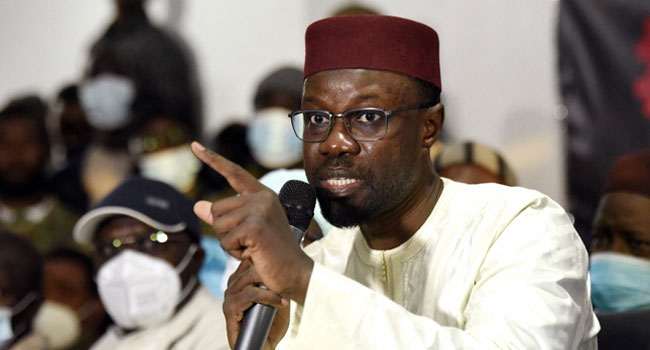The fate of Senegalese opposition politician, Ousmane Sonko, concerning his reinstatement on the electoral roll will be decided on Thursday 14th December. His eligibility to run in the upcoming February presidential election hinges on this ruling.
In a hearing that took place on Tuesday 12th December in Dakar, Senegal, Sonko’s legal team engaged with state-appointed counsel. Ciré Clédor Ly, Sonko’s lawyer, revealed that after listening to both parties for over eight hours, the judge retired to reflect on the case.
“On December 14, the judge will make his decision, guided solely by his conscience and the rule of law, his only beacon,” Ly stated.
Previously on November 17, Sonko received a promising sign when the Supreme Court of Senegal overturned a ruling by a court in the city of Ziguinchor. This earlier court decision had removed Sonko’s name from the electoral roll, effectively sidelining him from the presidential race. The Supreme Court’s intervention reinstated Sonko’s electoral eligibility.
However, the state’s representative, lawyer Adama Fall, has argued that Sonko’s request for reinstatement is “inadmissible”. According to Fall, Sonko submitted his application outside the established five-day deadline stipulated by law, thereby rendering it void.
“Sonko was fully aware of the decision to remove his name from the electoral roll when he filed his appeal,” Fall stated.
Despite this setback, Sonko’s legal team remains cautiously optimistic. His counsel, Saïd Larifou, argues that the issue is largely politically driven, but maintains that there are no legitimate legal grounds for Sonko’s removal from the electoral roll.
“Striking off Mr. Ousmane Sonko from the electoral roll presents no objective, legal justification,” Larifou stated, “This matter is heavily politicised, something unfortunately beyond our control.”
The former leader of the now dissolved PASTEF party was struck from the electoral roll following his conviction in June for allegedly “corrupting youth”. Despite being acquitted of the criminal charges actually laid against him, Sonko criticised the court’s ruling. Further compounding his troubles, Sonko has been in jail since late July, facing other, unrelated charges.
Sonko has consistently labelled his legal issues as political machinations engineered against him. The outcome of the ruling set for December 14 hence possesses enormous significance, not only for Sonko but also for Senegal’s democratic future, as the ability of opposition candidates to contest elections represents a vital element of a functioning democracy.
This unfolding narrative continues to attract local, regional, and international attention, with interested parties keenly awaiting the decision due later this week.





